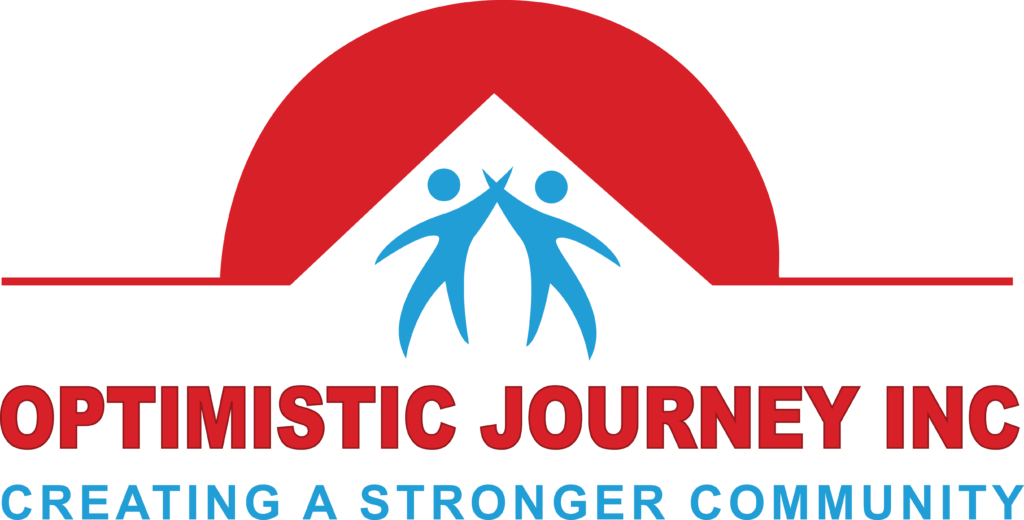
ABOUT OPTIMISTIC JOURNEY
About Optimistic Journey Inc interventions are viewed from an individual’s developmental perspective. We are providing a residential component; an out-client program. An individualized transitional living plan guides the services for each participant and will include any of the following services:
Provide sustainable housing for newly released offenders being admitted to half-way house upon release.
strategies and techniques as: problem solving, critical thinking, effective communication skills, decision-making, creative thinking, interpersonal relationship skills, self awareness building skills, empathy, and coping with stress and emotions. With life skills, one is able to explore alternatives, weigh the pros and cons and make rational decisions in solving each problem or issue as it arises. It also entails being able to establish productive interpersonal relationships with others.
Learning the basic skills of building homes, foundation, rooing, siding, electrical, plumbing, etc…..
Learn the basics of Real Estate Investing
Critical Thinking/Problem Solving: Exercise sound reasoning to analyze issues, make decisions, and overcome problems.
Articulate thoughts and ideas clearly and effectively in written and oral forms to persons inside and outside of the organization.
Build collaborative relationships with colleagues and customers representing diverse cultures, races, ages, genders, religions, lifestyles, and viewpoints.
Leverage existing digital technologies ethically and efficiently to solve problems, complete tasks, and accomplish goals.
Leverage the strengths of others to achieve common goals, and use interpersonal skills to coach and develop others.
Demonstrate personal accountability and effective work habits, e.g., punctuality, working productively with others, time and workload management, and understand the impact of non-verbal communication on professional work image.
Value, respect, and learn from diverse cultures, races, ages, genders, sexual orientations, and religions. Demonstrating, openness, inclusiveness, sensitivity, and the ability to interact respectfully with all people and understand individuals’ differences.
- Individual and Group Therapy – is a collaborative process (partnership) that aims to facilitate change and improve the individual’s quality of life. Counseling can help people confront barriers and modify behaviors that interfere with emotional, physical and mental well being.
- Substance Abuse Education – substance abuse is an important part of helping individuals understand and grow from their mistakes most repeat offenders have substance abuse problems.
- Transportation -Driving participants to job sites, and medical appointments.

Program staff is available to meet with individuals in school, on the streets, and at local agencies to, assess their needs and eligibility for services. These outreach services are designed to attract homeless individuals who are eligible and willing to participate in the program. Optimistic Journey staff is also often called upon to speak to schools, social service organizations, community neighborhood groups, and church groups regarding the services offered by Optimistic Journey. During these meetings, the staff provides information to educate the community about the needs of our individuals with unique backgrounds. Success stories of Optimistic Journey graduates will bring life to the struggles and accomplishments of individuals previously labeled as failures. Flyers and brochures explaining the program are distributed at these presentations and at job fairs throughout the county as well as by the street outreach program. These services heighten community awareness of the needs of homeless individuals and the services offered by Optimistic Journey.
All client information, including name, address, evaluations and any personal information is kept confidential and is not disclosed or transferred without written consent of the individuals. Optimistic Journey release of information form is specific and time-limited. All client files are kept locked, in a secure, fireproof cabinet. All individuals’ information entered on the data system is confidential. The program’s Policy and Procedures Manual contains the detailed confidentiality policy that must be followed by all program staff. Optimistic Journey agrees to cooperate with any research or evaluation efforts.
Optimistic Journey continuously looks for alternative funding sources for our services to ensure that the program continues when federal funding is not available. The organization also has a staff person whose responsibilities include writing grants for all possible sources of public and private funding (such as local, state-wide, and national foundations). The Board of Directors is committed to fundraising and creating fundraising campaigns.
Optimistic Journey will submit data quarterly to comply with requirements for data submission, periodic reports, annual reports, fiscal reports, and others as required to Congress. Optimistic Journey agrees to cooperate with any research or evaluation effort.
- Oversees the operations of Optimistic Journey including the home and the apartment program
- interviews, hires, supervises, trains and evaluates program staff and volunteers
- Ensures that all programmatic and life safety requirements for licensing are met, including recreation, leisure, therapy, medical, and emergency policies
- Maintains accurate statistics, client records, grant reports, and assists in development of program grants; updates program policies and procedures as needed
- Ensures that the housekeeping and maintenance of the program is completed
- Networks in the community and with other providers to provide outreach about Desoto and the needs of runaway and homeless individuals
- Participates in beeper rotation to act as Administrator on Call, as needed
- Participates in all staff meetings and staff training
- Participates in agency strategic planning and fundraising as requested
- Works cooperatively with all other agency programs, community providers, and funding and referral sources
- Performs direct care activities including intake, case planning, counseling, life skills education, outreach, advocacy, transportation, and recreation as needed
- Performs other administrative and direct care duties as requested
- Is supervised by the Executive Director
- Provides individual, group and crisis counseling to program participants;
- Performs direct care activities including intake, case planning, counseling, life skills education, outreach, advocacy, transportation, and recreation as needed;
- Assists in the develop of the individual transitional living plan for each resident and out client;
- Assesses the emotional status of potential residents;
- Provides referrals and linkages for mental health services as needed;
- Assists residents in areas of health and nutrition and other life skills as needed;
- Provides out client support and aftercare services to individuals and families;
- Maintains clients files by completing required documentation in a timely manner;
- Participates in staff meetings and development activities;
- Acts in place of the Program Director when requested;
- Works cooperatively with all other agency programs, community providers, and funding and referral sources;
- Performs other administrative and direct care duties as requested;
- Is supervised by the Program Director.
- Develops the individual transitional living plan for each resident and out client in the areas of life skills, education, and employment;
- Provides role modeling for individuals and assists individuals to gain skills need to become independent;
- Administers pre- and post- life skills assessments for each program participant;
- Conducts ongoing individual life skills sessions, implementing individual transitional living plans;
- Assists program participants in job attainment, educational advancement, and housing options;
- Maintains ongoing contact with employers, social service providers and schools to ensure successful participation by participants;
- Provides appropriate referrals and linkages for any needed services;
- Maintain client files by completing required documentation in a timely manner;
- Participates in staff meetings and development activities and performs any other duties as requested.
- Performs other duties as requested;
- Is supervised by the Program Director.
The staffing for Optimistic Journey includes both administrative and direct-care
staff. The administrative staff includes the Executive Director, the Business Manager, and the Program Director. The Program Director also provides direct care services. Direct-care staff includes three Life Skills Counselors, an Assistant Director/Therapist, a Night Counselor, and part-time fill-in Life Skills Counselors. All individuals employed by the program have the educational and professional qualifications needed to assist individuals to successfully transition to healthy living and self-sustainability. The staff of the program functions as a team to help each other to provide the best possible environment and opportunities for the individuals who participate in the program. While everyone has a specific role that is stipulated through their job description, see all staff members take on additional responsibilities as needed to ensure that “the job gets done”.
The Executive Director of Optimistic Journey is responsible for the overall operations of all agency services, and directly supervises all program directors, the business manager, the assistant executive director, and the foundation director. The Executive Director dedicates approximately 20 hours per week to Optimistic Journey. The Executive Director provides supervisory oversight and resource information and is the link between the staff and the Board of Directors. The Business Manager provides fiscal oversight for the program and participates in the development of budgets and reports. The Business Manager dedicates 40% of his time to Optimistic Journey each week.
The Program Director is responsible for the overall operations of our services and directly supervises all Optimistic Journey staff. The Program Director also works directly with the individuals, performing interviews, intakes, assessments, and counseling as needed. The Program Director also provides outreach, case management and life skills education as needed. The Program Director performs administrative functions such as reporting, record keeping, and fundraising. The Program Director dedicates 100% of his/her time to our program. The Assistant Director/Therapist provides direct-care services including case management, intake interviews, assessments, counseling, outreach, and life skills education. The Life Skills Counselors provide general supervision, life skills education, rapport counseling, intake interviews, advocacy, transportation, and recreation. The Life Skills Counselors also perform various household functions as needed. The Night Counselor works on the overnight shifts in Optimistic Journey home, providing supervision to residents as needed. Fill-in staff is substitutes for regular staff to ensure that the program has adequate staff ratios when regular staff is unavailable to fill shifts. The direct care staff ratio is 1:5 in the home component, which requires 24 hour, 7 days a week awake coverage, and 1:4 in the apartment component, which is semi-supervised. Semi-supervision includes several daily visits to the apartments by staff and an on-call staffing pattern to ensure that a staff person is available to be on-site within 15 minutes in case of emergency. Optimistic Journey staffing patterns conform to the requirements set by the Florida Department of Human Services Bureau of Licensing which mandate a 1:6 ratio to provide adequate supervision and treatment
This project focuses primarily on the impact of the individuals with unique backgrounds in the South Florida area and surrounding communities are considered some of the most high-risk individuals in Palm Beach County.